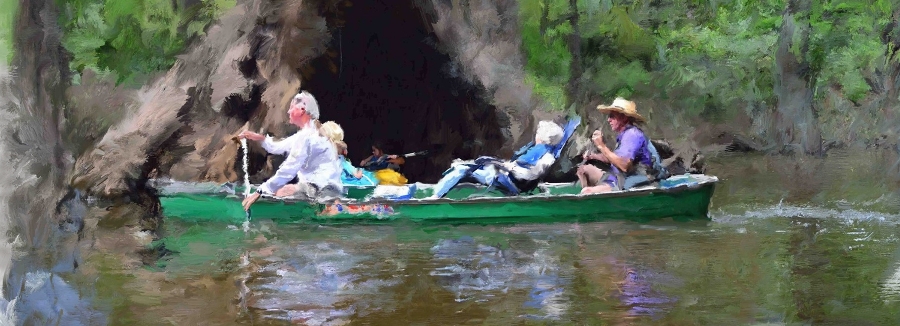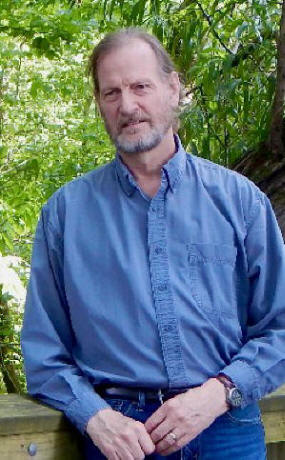
~ Delta Poetry Review ~
Featured Poet • Kendall Dunkelberg
 Kendall
Dunkelberg directs the Low-Residency
MFA in Creative Writing and the Eudora Welty Writers’ Symposium at
Mississippi University for Women, where he is also the chair of the
Department of Languages, Literature, and Philosophy. He is editor of
Poetry South and the founding advisor for Ponder Review. He
has published three collections of poetry, Barrier Island Suite,
Time Capsules, and Landscapes and Architectures, as well
as a collection of translated poems by the Belgian poet Paul Snoek:
Hercules, Richelieu, and Nostradamus and the creative writing
textbook, A Writer’s Craft: Multi-genre Creative Writing. His
poems and translations have appeared in many journals over more than
thirty years, including recently, Delta Poetry Review, Oyez Review,
Tar River Poetry, Valley Voices, Juke Joint, and About Place.
He is currently at work on his fourth poetry collection, Tree Fall
with Birdsong. His musings about poetry, food, teaching, and
technology can be found at kendalldunkelberg.com.
Kendall
Dunkelberg directs the Low-Residency
MFA in Creative Writing and the Eudora Welty Writers’ Symposium at
Mississippi University for Women, where he is also the chair of the
Department of Languages, Literature, and Philosophy. He is editor of
Poetry South and the founding advisor for Ponder Review. He
has published three collections of poetry, Barrier Island Suite,
Time Capsules, and Landscapes and Architectures, as well
as a collection of translated poems by the Belgian poet Paul Snoek:
Hercules, Richelieu, and Nostradamus and the creative writing
textbook, A Writer’s Craft: Multi-genre Creative Writing. His
poems and translations have appeared in many journals over more than
thirty years, including recently, Delta Poetry Review, Oyez Review,
Tar River Poetry, Valley Voices, Juke Joint, and About Place.
He is currently at work on his fourth poetry collection, Tree Fall
with Birdsong. His musings about poetry, food, teaching, and
technology can be found at kendalldunkelberg.com.
Black Racer
I still remember coming home to find him
stretched out, lying across our brick steps,
a black snake as long as my leg. I had seen
snakes, even had a run-in with a rattler,
sunning on some rocks in New Mexico,
lethargic enough to ignore our dog and only
flick
his tail, once we were safely away. I'd been
stung,
I thought by wasps, in a tall Missouri prairie,
then driven to Texas where my new landlady
pronounced "snakebite" and prescribed Benedryl
when she saw my grapefruit-sized ankle.
So I kept a healthy distance between me
and this king of the ground, though he didn't
look
like any venomous creature I could identify,
yet was no common garter snake either.
He must have heard my footfall, for soon,
he slithered into our bushes, under the house,
or back into his hole. Later, I read he was more
of a danger to rats and mice than to humans
and I was glad we had shared a summer morning.
I've never seen another black racer in our yard,
though if he lives under our porch, I don’t
mind;
he can have his home and maybe keep rodents
away.
I've seen other large snakes on the road or on
the path
by the river. I give them a wide berth to pay my
respects
to a life that seems both alien and familiar, a
life at home
both on and under the ground, not so much deadly
as familiar in the land of the dead, perhaps a
messenger
or a reminder that there are limits to our human
experience.
Stereoscopic
Earth and sky, mud and water,
blood and breath whirl and swirl.
Here there is primordial ooze
and futuristic sun spot static,
damp canyons and dry arroyos,
hurricanes of magical dust.
Here the eye is a schizophrenic
calm, paradox of paradise in a
dream landscape. Where are
Dali’s melting clocks, dripping,
dripping with their semblance
of distorted order? Here the surreal
is natural, normalized, comforting,
yet disturbing. In this stereoscopic
vision there is no more status quo.
Gilgamesh
Grief is a cold dark country,
whose residents are clad in feathers,
whose songs stick in the mouth
like mud and straw drying
in black sun to make bricks.
Here there are no distinctions:
status is leveled, no one holds
power, everyone is masked
and quarantined. Here,
people are no longer people,
but foreigners among their own
tribe. Time is irrelevant until
one day you wake to the normal
morning sounds: A dove outside
your window, a car driving by.
Inanna
A flurry of cedar waxwings reveals the mulberry,
its lush fruit nearly ready to ripen into deep, royal
purple. The swallows have returned under the bridges,
crisscrossing air, chasing one another, rebuilding nests,
as one lone drake flies overhead, straight as an arrow.
Choose your goddess: Inanna, Ishtar, Persephone, Astarte.
See her finishing her trek from the underworld, where she
has been replaced by her lover or her mother has bartered
for her release. Look, the fleabane and wood sorrel signal
her return. The tree canopy is again replete with green,
and the heaviest late winter storms have passed us by.
Yes, there may still be summer hail, even hurricanes.
Yes, we know winter’s dark looms just over the horizon.
For now, rejoice in the soft song of her familiar doves.
Rejoice with her bees as they collect sweet nectar.
| Archive | Submissions | About |